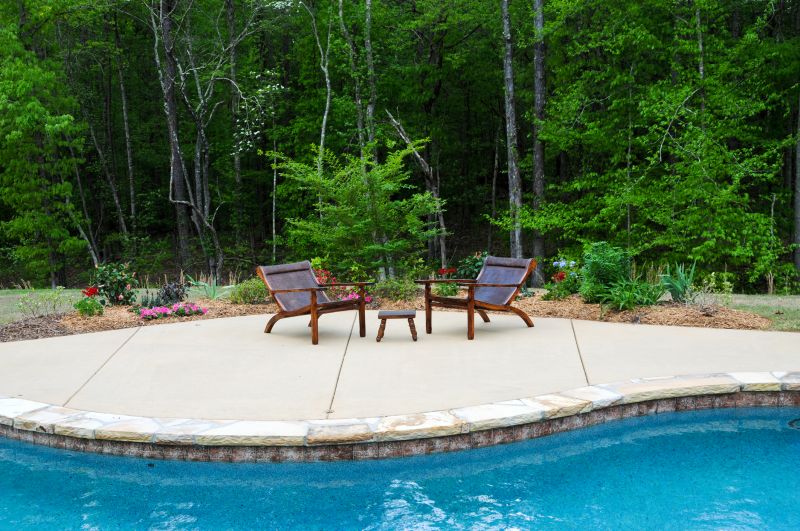Favorite Pool Deck Resurfacing Options for a Stunning Finish
Upgrade your pool area with popular products that deliver both beauty and resilience for years to come.
 A well-maintained pool deck enhances the overall appeal and safety of outdoor swimming areas. When considering resurfacing options, it's important to evaluate materials that offer durability, slip resistance, aesthetic versatility, and ease of maintenance. Pool deck resurfacing products come in a wide range of types, each suited to different preferences and environmental conditions. From textured coatings to stamped concrete, the right choice can transform an aging or worn surface into a functional and attractive space.
A well-maintained pool deck enhances the overall appeal and safety of outdoor swimming areas. When considering resurfacing options, it's important to evaluate materials that offer durability, slip resistance, aesthetic versatility, and ease of maintenance. Pool deck resurfacing products come in a wide range of types, each suited to different preferences and environmental conditions. From textured coatings to stamped concrete, the right choice can transform an aging or worn surface into a functional and attractive space.
Top Overall Option
Concrete Resurfacing Coating
A concrete resurfacing coating offers a versatile and durable solution for revitalizing pool decks. It can be applied over existing concrete surfaces to create a smooth, slip-resistant finish that withstands exposure to water and foot traffic. Available in various textures and colors, this type of coating allows for customization while providing a protective layer against cracking and staining. Proper surface preparation and application are essential to achieve optimal results and longevity.
Types of Products For Pool Deck Resurfacings
Epoxy Coatings
Epoxy coatings provide a hard, glossy finish that resists water and stains, suitable for pool decks requiring a smooth, durable surface.
Polyurethane Coatings
Polyurethane offers flexibility and UV resistance, making it ideal for outdoor pool areas exposed to sunlight.
Stamped Concrete
Stamped concrete creates decorative patterns and textures, mimicking natural stone or brick for an aesthetic upgrade.
Overlay Systems
Overlay systems involve applying a thin layer of specialized material over existing surfaces to refresh appearance and improve durability.
Polymer Resins
Polymer resins provide a seamless, waterproof surface with customizable colors and textures.
Rubberized Coatings
Rubberized coatings offer a soft, slip-resistant finish suitable for safety-focused pool decks.
Acrylic Sealers
Acrylic sealers enhance color and provide a protective barrier against stains and moisture.
Polyaspartic Coatings
Polyaspartic coatings cure quickly and offer excellent UV stability, suitable for rapid resurfacing projects.
Quartz Aggregate Finishes
Quartz finishes add texture and slip resistance, with a sparkling appearance that enhances visual appeal.
Pebble Tec Finishes
Pebble finishes provide a natural, textured surface with a distinctive look and feel.
Silicone-Based Coatings
Silicone coatings offer water resistance and flexibility, suitable for areas with fluctuating temperatures.
Decorative Stains
Stains add color and depth to concrete surfaces, allowing for artistic and personalized designs.
Resin-Based Coatings
Resin coatings provide a seamless, durable finish with customizable options for texture and color.
Textured Coatings
Textured coatings enhance slip resistance and can mimic natural surfaces like stone or slate.
Painted Finishes
Specialized pool deck paints offer quick application and a wide array of color choices, suitable for budget projects.
Popular Choices
Epoxy coatings are frequently chosen for their durability and glossy finish, suitable for high-traffic pool areas.
Stamped concrete remains a popular decorative option, offering customizable patterns and textures.
Quartz finishes are favored for their textured surface and aesthetic sparkle, adding visual interest.
Resin-based coatings are appreciated for their seamless appearance and durability in outdoor environments.
Polyurethane coatings are selected for their UV resistance and flexibility, maintaining appearance over time.
Pebble finishes are popular for their natural look and tactile surface, providing a slip-resistant area.
Stains are often used to add vibrant color and artistic patterns to concrete pool decks.
Polyaspartic coatings are trending for rapid curing and excellent UV stability, minimizing downtime.
Rubberized finishes are chosen for safety and slip resistance, especially in family-friendly pool areas.
Textured coatings are popular for their slip-resistant qualities and ability to mimic natural stone textures.
Acrylic sealers are used to enhance color and provide a protective layer, popular for finishing concrete surfaces.
Painted finishes are chosen for quick updates and a broad palette of colors, suitable for budget-conscious projects.
Choosing the appropriate resurfacing product involves understanding the specific needs of your pool area, such as exposure to water, foot traffic, and weather elements. Some materials provide a more seamless appearance, while others allow for decorative finishes like patterns or color accents. Proper surface preparation is crucial to ensure longevity and performance of the resurfacing material. Consulting with professionals or thoroughly researching product specifications can help in selecting a solution that aligns with your aesthetic goals and practical requirements.
Maintenance considerations are also key; some surfaces require regular sealing or cleaning, while others are more resistant to staining and cracking. Installation methods vary from DIY-friendly overlays to professional applications, impacting project timelines and costs. Ultimately, investing in quality resurfacing products can extend the lifespan of your pool deck, improve safety, and enhance outdoor enjoyment for years to come.
Key Buying Considerations
- Durability and resistance to water, UV rays, and foot traffic
- Slip resistance and safety features for wet surfaces
- Compatibility with existing pool deck materials and condition
- Ease of application, whether DIY or professional installation
- Maintenance requirements, including cleaning and sealing
- Aesthetic options such as colors, patterns, and textures
- Curing time and project timeline constraints
- Cost and long-term value of the resurfacing product
- Environmental conditions like exposure to chemicals or temperature fluctuations
- Availability of warranties or manufacturer support
- Compatibility with additional features like heating or lighting
- Impact on pool safety regulations and standards
- Surface flexibility to accommodate ground movement or settling
- Resistance to cracking, chipping, or staining
- Ease of repair or touch-up if needed
